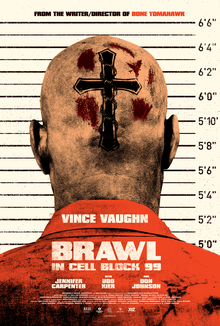
Director: S. Craig Zahler
Running Time: 132 Minutes
Certification: 18
Starring: Vince Vaughn, Jennifer Carpenter, Don Johnson, Udo Kier, Marc Blucas, Mustafa Shakir, Thomas Guiry, Dion Mucciacito
Having begun his career as a novelist and screenwriter, S. Craig Zahler made his directorial debut with 2015's Bone Tomahawk, a tense and shocking blend of horror and western elements. His sophomore follow-up may differ as a throwback to old-school exploitation flicks, but carries on the shocking brutality which grabbed many viewers attentions.
After being laid off from his job, Bradley Thomas (Vince Vaughn) resorts to working as a drug mule. After a job goes wrong and results in a shootout with police, he ends up in prison, intending to serve his years and be eventually reunited with his loved ones. He gets word that a gang has kidnapped his pregnant wife, and threaten surgery on his unborn child, unless Bradley kills an inmate in Cell Block 99.
Before Adam Sandler reminded the public of his acting prowess with Uncut Gems, Zahler offered Vince Vaughn the opportunity to do a similar thing. He's known for his work in comedies which are unfavourably received, and I must admit these films left me not a fan of Vaughns. That said, I'm happy to admit that his portrayal here is absolutely excellent, and the best I've seen of his career. He perfectly captures the coiled rage lying within his character, ready to unleash in such horrifying ways, as evidenced when he destroys a car with his bare hands.
But he's also full of loyalty, willing to sacrifice years of freedom as opposed to giving up his employer. His driving motivation are his wife and unborn child, wanting them to have a long and happy life. He's willing to do anything to ensure that, which leads to him embarking on a hellish descent which feels inescapable. While that's happening, the sheer nihilism keeps escalating, until we witness such gruesome scenes depicted, horrifically realised in ways that won't be easily forgotten.
Throughout the feature, it does feel as though Zahler uses the women as mere props, intent on driving Bradley's story, and serving little other purpose. There's also the problematic use of non-white actors, as their inclusion seems to be as the victims of such brutality, or antagonists made to hammer home a message of American patriotism. A shame, as these are dated aspects which mar a well-made feature of such unforgiving ferocity.


Comments